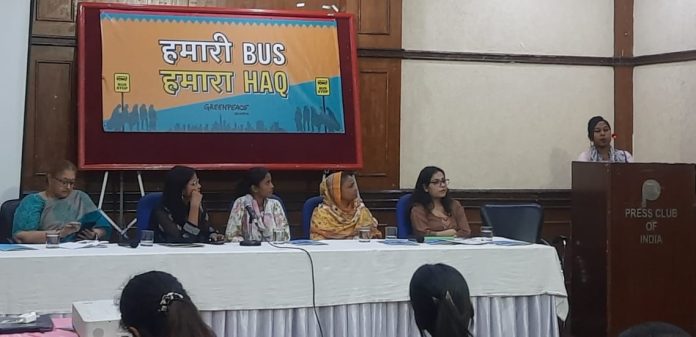Zubaida Khatoon said she commutes from her home in Sundernagri to Matasundari College but faces sexual harassment. Marshalls are deployed in buses but they hardly come forward for help, she added.
– Abdul Bari Masoud
New Delhi, 4 October 2023: Not satisfied with the public bus transport system, 80 percent women commuters in the national capital said they face humiliation, bus stop snub and other types of sexist remarks. They demanded equality and safety in public buses and to start women-dedicated special buses as well as mohallah bus service.
At a press conference at the Press club of India, Bangalore-based NGO GreenPeace India today released the survey report on Delhi public transport.
Titled “Halt for women bus users in Delhi,” the report, based on a survey conducted with a sample size of over 500 women, reveals an alarming statistic – a staggering 82 percent of surveyed women bus users reported instances of buses failing to stop for them at designated bus stops. Among the respondents, 29 percent faced such instances frequently, while another 50.2 percent experienced them occasionally. Moreover, 54.2 percent of women bus users reported facing discrimination and receiving derogatory comments from both bus workers and male passengers, specifically in relation to the free bus scheme.
Later in a powerful display of unity and determination, women of the ‘Power The Pedal’ community in New Delhi gathered at Krishi Bhavan bus stop near Central Secretariat, wielding placards to voice their concern over the mistreatment and discrimination they face while using public buses. This also marked the release of Greenpeace India’s latest report, which shed light on the underlying gender discrimination experienced by women bus users in Delhi since the introduction of the free bus scheme for women in 2019.
Nitu Thakur, a member of the ‘Power The Pedal’ community, expressed her concerns, stating, “Such experiences not only hamper women’s access to public transport but also create an unwelcoming and unsafe environment. We have often seen buses not stop if the bus shelter has only women waiting. We are often made to feel like freeloaders with staff addressing us rudely.”
The free bus scheme was introduced by the Delhi government to promote access to public transport and encourage more women to utilize buses for their daily commute. Reports have since indicated the scheme’s positive impact, with the percentage of women ridership increasing from 25 percent in 2020-21 to nearly 33 percent in 2022-23.
Avni Goyal, activist and co-author of the report, commented on the report, “Throughout history, women have been treated unequally and subjected to various forms of discrimination. Our cities’ public transport systems are another reflection of this inequality. The fact that these forms of discrimination continue to prevail – particularly when it comes to providing equal services and respecting women passengers – is only further proof of the urgent need for gender sensitisation and gender-affirmative action in our society.”
The report also reveals some of the key solutions to tackle the problem of buses not halting for women commuters. According to the survey, 84.8 percent of women bus users support the idea of inducting more women bus drivers and conductors. This step is seen as a solution to improve the accessibility and safety of buses for women. Additionally, 91.6 percent of surveyed women bus users expressed their support for the implementation of dedicated women-only buses across Delhi!
Avinash Chanchal, Greenpeace India’s campaign manager, emphasized the solutions required to ensure the safety of women commuters, saying, “The findings of this report are deeply concerning and highlight the persistent challenges faced by women bus users in Delhi. It is troubling to learn that every second women bus user has faced discrimination over the free bus scheme. These statistics emphasize the urgent need for comprehensive measures that need to be undertaken by the Delhi government. Building gender sensitive public bus infrastructure, instigating behavioral shifts among bus workers and educating people to bridge the information gap surrounding the free bus scheme will play a crucial role in ensuring the safety, dignity and equal access of women in public transport.”
The report recommends several important measures to help enhance the safety and efficiency of women bus users’ experiences. These include setting up a monitoring system to ensure bus halts for women passengers, a dedicated complaints redressal system, installation of panic buttons, improved lighting around bus stops, increasing the participation of women in the transportation sector’s workforce and introduction of women-only mini-buses, among other recommendations.
While the free bus for women scheme in Delhi has undoubtedly brought about positive changes – especially for women belonging to lower income groups – such as access to better employment opportunities, access to spaces for leisure, and the ability to traverse longer distances, the persisting issues of discrimination and buses not halting for women highlight the need for greater efforts in creating a safe and inclusive public transport system.
Jahanara said she faces discrimination in buses due to her profession and often bus conductor prevents her boarding the bus.
Similarly, Zubaida Khatoon said she commutes from her home in Sundernagri to Matasundari College but faces sexual harassment. Marshalls are deployed in buses but they hardly come forward for help, she added.




